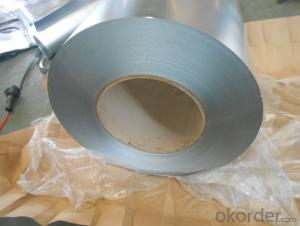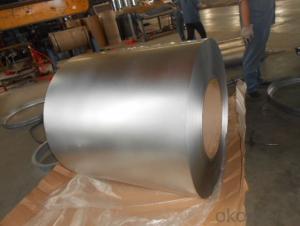High Quality Galvanised Steel in Coil
- Loading Port:
- Tianjin
- Payment Terms:
- TT OR LC
- Min Order Qty:
- 25 m.t.
- Supply Capability:
- 80000 m.t./month
OKorder Service Pledge
OKorder Financial Service
You Might Also Like
Product Description:
Quick Details
| Grade: | galvanized sheet,DX51D+Z SGCC CSB S280GD+Z S350GD+Z | Standard: | JIS,AISI,ASTM,GB,DIN,EN,JIS,AISI,ASTM,GB,DIN | Length: | 500mm-12000mm,1000~6000mm |
| Thickness: | 0.1mm-100mm | Width: | 600mm-2000mm | Place of Origin: | Jiangsu China (Mainland) |
| Brand Name: | DX51D+Z SGCC CSB S280GD+Z S350GD+Z | Model Number: | galvanized sheet,ASTM A653, ASTMA526-90, JIS G3302, DIN EN10142-92, GB/T 2518 | Type: | Plate |
| Application: | indurstry;electricity construction,home appliances,kitchen appliance, mechanical etc | Certification: | SGS | Surface: | Galvanized |
| Technique: | Cold Rolled | Special Use: | High-strength Steel Plate | Delivery Time: | 3-15 days |
| Delivery Term: | TT or LC |
Packaging & Delivery
| Packaging Detail: | Export standard package :bundled wooden box or be required; The inner size of container is below: 20 ft GP:5.8m(length)x 2.13m(width)x 2.18m(high) about 24-26 CBM 40 ft GP:11.8m(length)x 2.13m(width)x 2.72m(high)about 68 CBM We will packing as the factory ,and reach the stander of export . Or as the customer request.In addition,We will make the products with good surface protection |
| Delivery Detail: | within 3--15 days according to the Quantity |
Specifications
China supplier Galvanized Steel Sheet
1:thick:0.25-6mm
2:width:500-1500mm
3:length:any length can be cut
4:on stock
- Q:How are steel coils annealed to improve their properties?
- Steel coils are annealed by heating them to a specific temperature and then slowly cooling them down. This process helps to relieve internal stresses, improve ductility, and refine the grain structure, resulting in enhanced mechanical properties.
- Q:How are steel coils inspected for hardness using hardness testers?
- Steel coils are inspected for hardness using hardness testers by applying a specific amount of force onto the surface of the coil and measuring the depth or indentation left by the indenter. This indentation is then compared to a hardness scale to determine the hardness of the steel.
- Q:How do steel coils contribute to the manufacturing of agricultural machinery?
- Steel coils are used in the manufacturing of agricultural machinery as they provide the necessary strength and durability required for heavy-duty equipment. These coils are often used to fabricate components such as frames, chassis, and structural supports, ensuring stability and reliability of the machinery. Additionally, steel coils can be easily shaped and welded, allowing for customization and versatility in design, ultimately contributing to the overall efficiency and functionality of agricultural machinery.
- Q:We have to do a project for school on steel mines and i need 4 PROPERTIES OF A STEEL MINE PLEASE HELP!!! URGENT!!!
- The existence of them would be a good start. Steel is produced from iron ore, not mined.
- Q:and also what makes different hardness of stainless steel?
- a little clarification. steel doesn't become stainless. There are many different types of steel, which is an alloy of iron and other element. The other elements determine things like hardness, corrosion resistance, etc. One element is chromium, which when added in the correct proportions, forms stainless steel. PS, there are many many different stainless steels, with different proportions.
- Q:What are the advantages of using steel coils in the manufacturing industry?
- There are several advantages of using steel coils in the manufacturing industry: 1. Strength and Durability: Steel coils are known for their high strength and durability, making them ideal for various manufacturing processes. They can withstand heavy loads and resist deformation, ensuring that the final product is reliable and long-lasting. 2. Versatility: Steel coils can be used in a wide range of applications across different industries. They are highly versatile and can be shaped, molded, or cut into different forms and sizes, making them suitable for diverse manufacturing needs. 3. Cost-effective: Steel coils are a cost-effective option for the manufacturing industry. Due to their strength and durability, they have a longer lifespan compared to other materials, reducing the need for frequent replacements. This leads to cost savings in the long run. 4. Excellent Thermal Conductivity: Steel has excellent thermal conductivity, meaning it can efficiently transfer heat. This makes steel coils suitable for applications that require temperature regulation, such as in the automotive and HVAC industries. 5. Recyclability: Steel is one of the most recycled materials globally. By using steel coils in the manufacturing process, companies contribute to a more sustainable and eco-friendly approach. Recycling steel reduces the need for raw materials extraction and energy consumption, resulting in a reduced carbon footprint. 6. Corrosion Resistance: Steel coils can be coated with protective layers, such as galvanization or anti-corrosion treatments, to enhance their resistance to rust and corrosion. This makes them suitable for outdoor applications or industries with corrosive environments. 7. Consistency and Quality: Steel coils offer consistent quality and uniformity in terms of dimensions, mechanical properties, and surface finish. This ensures that the end products meet the required specifications and maintain a high level of quality. In summary, the advantages of using steel coils in the manufacturing industry include their strength, durability, versatility, cost-effectiveness, excellent thermal conductivity, recyclability, corrosion resistance, and consistent quality. These benefits make steel coils a popular choice for various manufacturing processes across different industries.
- Q:What is the difference between cold rolled strip and cold rolled steel coil?
- Cold rolled steel strip: the width is below 900mm! Cold rolled steel coil: the width is above 1000mm! Materials and purposes are not very different, basically the same!
- Q:What are the different methods of coil leveling?
- There are several methods of coil leveling that are commonly used in various industries. These methods include: 1. Roller leveling: This method involves passing the coil through a series of rollers that apply pressure and gradually flatten the coil. The rollers can be adjusted to apply varying levels of pressure, allowing for precise control over the leveling process. 2. Stretch leveling: In this method, the coil is subjected to tension forces that elongate the material and remove the internal stresses. The coil is passed through a series of rollers while being stretched, which results in a more uniform and flat surface. 3. Temper leveling: This method involves heating the coil to a specific temperature and then cooling it rapidly. The rapid cooling process helps to equalize the stresses within the coil and improve its flatness. Temper leveling is often used for high-strength steels. 4. Roller leveling with leveling rolls: This method uses additional leveling rolls that are positioned above and below the main leveling rollers. The leveling rolls apply pressure to specific areas of the coil to correct any unevenness or distortions. 5. Tension leveling: This method involves applying tension to the coil while it is being processed. The tension helps to straighten and flatten the material, resulting in a more even and flat surface. 6. Precision leveling: This method is used for high-precision applications where extremely flat and uniform coils are required. Precision leveling involves a combination of roller leveling, stretch leveling, and other corrective measures to achieve the desired level of flatness. Each of these methods has its own advantages and limitations, and the choice of method depends on factors such as the type of material being leveled, the required flatness tolerance, and the intended application of the coil.
- Q:I'm trying to bend stainless steel spoons, forks knives etc. for an art project. Will heating them help bend them into certain shapes or will heat only strengthen it? What is the best way to bend stainless steel?
- We are regular buyers of such bends.
- Q:My neighbor who has an older model mustang installed a steel clutch in it and has blown 4 transmissions as a result.Can any mechanic explain why a steel clutch would kill transmissions? What other modifications would the car need in order to prevent this?
- First of all it's not really a steel clutch..it is called a sintered iron clutch disk... a sintered iron clutch has a very aggressive amount of friction and is generally only used in racing application because of this...also it is ushually a non sprung disk. all of these factors = a very abrupt ingagement of the clutch which will shock the driveline very badly...say he's making 400hp and has really sticky tires..there is bound to be a weak link between the engine and the tires, in a factory driveline this would probably have been the clutch(it would slip) but since he has upgraded it he has now found the next weekest llink..in this case the transmission, he either needs to look into a beefier box or not launch the car so hard.
1. Manufacturer Overview |
|
|---|---|
| Location | |
| Year Established | |
| Annual Output Value | |
| Main Markets | |
| Company Certifications | |
2. Manufacturer Certificates |
|
|---|---|
| a) Certification Name | |
| Range | |
| Reference | |
| Validity Period | |
3. Manufacturer Capability |
|
|---|---|
| a)Trade Capacity | |
| Nearest Port | |
| Export Percentage | |
| No.of Employees in Trade Department | |
| Language Spoken: | |
| b)Factory Information | |
| Factory Size: | |
| No. of Production Lines | |
| Contract Manufacturing | |
| Product Price Range | |
Send your message to us
High Quality Galvanised Steel in Coil
- Loading Port:
- Tianjin
- Payment Terms:
- TT OR LC
- Min Order Qty:
- 25 m.t.
- Supply Capability:
- 80000 m.t./month
OKorder Service Pledge
OKorder Financial Service
Similar products
New products
Hot products
Related keywords




























